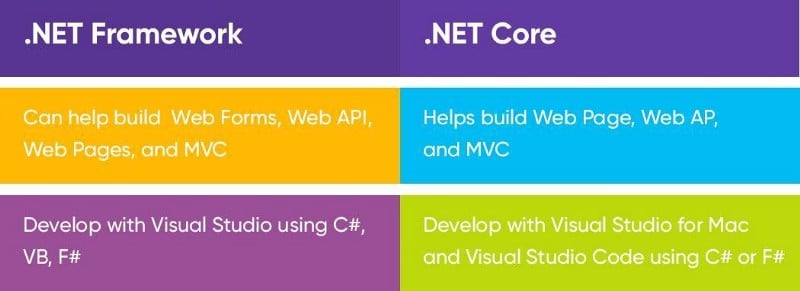.NET Framework Vs .NET Core: A Complete Comparison
Last Updated on December 31, 2024
Quick Summary
In this blog post, we are going to compare two of the leading platforms in the .NET ecosystem, .NET Framework vs .NET Core. The comparison guide highlights the differences among these frameworks based on different parameters, such as performance, scalability, deployment models, platform compatibility, and more. Whether you’re building Windows applications or cross-platform solutions, this guide helps clarify the strengths and limitations of both technologies, allowing you to choose between .NET Framework or .NET Core for your project.
In the .NET ecosystem, the debate between .NET Framework and .NET Core has been an ever-green, hot topic in the software development community. The .NET ecosystem is vast and comprises a family of software development languages, frameworks, and tools, such as JIT, AOT, BCL, C#, VB.NET, ASP.NET, Entity Framework, WinForms, WPF, and Xamarin. But amidst this extensive lineup, the most curiosity-generating question remains: How does .NET Core differ from .NET Framework? And more importantly, should you upgrade from .NET Framework to .NET Core?
This comparison guide will clear the clouds of confusion that have been surrounding your mind. We will walk you through the comparison of the .NET Framework vs .NET Core, highlighting the core differences to help you choose the best framework for your next project. Let’s dive in to understand the core fundamentals of the two popular runtimes, the .NET Core and .NET Framework.
The old and classical debate is still on. Today I am going to bring an interesting visually engaging Infographic blog post, which will give you all your answers and eradicate your confusion.
The .NET ecosystem comprises a family of software development languages, frameworks, tools, etc. like JIT, AOT, BCL, C#, GC, VB.NET, ASP.NET, ML.NET, Entity Framework, WinForms, WPF, F#, Xamarin, an runtime.
However, the most curiosity-generating question remains- How .NET Core is different from the .NET Framework? Or if one should upgrNDade from .NET Framework to .NET Core?
With this post, I will try to make your perceptions of both these runtimes clear, and I will shed some light on some crucial factors that help you choose the right platform for your web application development.
Before we start comparing NET Framework vs NET Core, let us understand first about the .NET platform. Microsoft built the .NET software development platform to create several types of applications. Using .NET, developers can use the tools and libraries handy to build their aspired software applications.
If we talk about server-side applications, .NET provides two implementations which have the same components for developers:

The .NET Framework is the Next Generation Windows Service by Microsoft persisting since the year 2000. The runtime environment of this Framework helps developers build Windows applications, web services, and desktop apps for Windows.

The two most crucial components of the .NET Framework are:
In all, .NET is an object-oriented environment, which is easy to use and supports multiple languages. The only constraint is it being closed-source, to overcome this Microsoft brings .NET Core as an open-source platform.
.NET Core is a framework that aids in building applications for all operating systems- Linux, Mac, and Windows. It supports programming languages like C#, F#, Visual Basic for developing apps and libraries.
Admirable features like microservices, high-performance web, multiple APIs & components, and more make this platform adorable for the software developers. Websites, mobile, cloud, gaming, desktop, web, and AI applications can be built using .NET Core.
Looking for scalable and cost-effective .NET core application development?
Connect with us to hire .NET Core developer to get your job done at your ease and convenience.

The .NET Framework enables developers to build apps only for the Windows platform, whereas .NET Core has cross-platform compatibility, which goes with building apps for Mac, Linux, and Windows.
You can compile and access the programs written in the .NET Framework from one language to other languages. Whereas, the programs you write in .NET Core are ready to migrate from the current application to other platforms.
Microsoft licensed the .NET Framework release; hence, it is proprietary software apart from some components of the Framework, which are open-source. However, .NET Core is a completely free open-source software framework.

When comparing .NET Framework vs .NET Core, another important aspect to consider is the deployment model. Using the .NET Framework, developers need to deploy their applications only via the Internet Information Server. An aid to do so, they may use Xcopy deployment which copies files to the intended directories. Small and straightforward applications work well with Xcopy, but migrating complex apps is very tedious.
.NETCore, however, offers flexible deployment. The latest versions of .NET Core can be instantly updated and uploaded on one or many machines without affecting the existing app. Also, apps can be directly deployed via the cloud, or the developers can create their custom hosting process and self-host.

Apps built on .NET Core perform better than those developed on .NET Framework. With Core, developers can drastically improve the performance of their applications even without additional hardware. Thanks to the automatic recompilation feature that optimizes the apps build with .NET Core.
Also, developers can build, test, and deploy apps directly on the cloud, which ensures hassle-free scalability and performance.
App development with .NET Framework lags in security, flexibility, and speed. The just-in-time compiler first compiles the CIL code into executable code and captures it on .NET Native Image Generator utility for manual compiling and caching.

Applications built on the .NET Framework can take advantage of the in-built class libraries that enable easy operations like file reading/writing, graphic rendering, XML doc manipulation, and DB interaction. And similarly, even apps built with .NET Core can use all these robust class libraries.
Moreover, .NET Core provides the redesigned common language runtime called CoreCLR, through which developers can choose, pick, and include only those essential libraries that they require in their .NET application and omit the others. So, in the battle of library collection between .NET Framework vs .NET Core, both are winners.

From the above-displayed comparison of the two platforms, .NET Core is giving a greater benefit to the developers by saving time and resources.
Nevertheless, let us find out what kind of applications you can build with both these platforms.

Sometimes, you do not need to migrate your entire application to .NET Core. Especially, if it is a big complex app, and all it requires is some modification, you must enhance its features in .NET Framework itself. Also, you can extend your current app by adding new features or services built on ASP .NET Core.
Most of the libraries support .NET Standard. However, when your API surface becomes much larger and needs packages like NuGet or other libraries that are not compatible with .NET Standard libraries, you should still use the .NET Framework. .NET Standard 2.0 supports code sharing with .NET Core and all other .NET implementations.
Web Form Applications, ASP .NET Web Pages, WCF Services, all Workflow- services, and programming languages Visual Basic & F# are not yet available for .NET Core. For using these services and technologies in your application, you might have to keep using the .NET Framework.
.NET Core Some platforms are not adaptive to .NET Core, and some services like the Azure services are not available for .NET Core. For such applications, you must continue with the classic .NET Framework.
Are you looking to choose .NET for your next product development?
Then do, Hire .NET developer from us to have dynamic and secure web application development.
As you want your application to run on multiple OSes and platforms, .NET Core is the right choice for you. Developers can use Visual Studio for Windows app, Visual Studio Code for Windows, MAC, and Linux apps. Moreover, the command line interface CLI can be useful for all supported platforms.
.NET Core and ASP .NET Core is the most favorable choice by Microsoft for developing high-performance and scalable apps. You can use as many microservices to achieve the goal of performance. As you use ASP .NET Core, you may save infrastructure costs as it uses lesser Virtual Machines (VM).
Your app may be depending on several different versions of .NET, and multiple services can co-exist on the same server with .NET Core.
Microservices are small software applications that make up the service-oriented architecture. In that case, each of these services represents unique processes, which are independent of each other.
.NET is the most profound technology that has helped the tech world take the shape that it is today. We hope that by going through the comparison parameters of .NET Core vs .NET Framework, you will certainly obtain the insights to make an informed decision. Still, if you have any confusion about selecting .NET Framework or .NET Core, you can sit with our expert analysts and project managers to find out what’s best for you. The best .NET development company brings out the best match suitable for your enterprise application ASP.NET MVP development.
The best .NET development company brings out the best match suitable for your enterprise application. Whereas, for your cross-platform application, collaborate with our .NET Core developers to build experiences that yield results.
Find out the complete infographic for .NET Framework vs .NET Core here
.NET Core will certainly outperform .NET Framework due to its lightweight and modular design. It supports asynchronous programming and includes features like the Kestrel web server, which enhances performance significantly. So, if your project demands high scalability and speed, you should opt for .NET Core to make your project a success.
Well, you should select .NET Framework if you’re working on an existing Windows-only app that relies on technologies like ASP.NET Web Forms, WCF services, or third-party libraries. Because these technologies are not compatible with .NET Core. However, .NET Core is a good option if you seek to build high-performing, scalable cross-platform applications.
The architecture of .NET Core is written from scratch to make it modular and lightweight, and that is what makes .NET Core faster than .NET Framework.
Your Success Is Guaranteed !
We accelerate the release of digital product and guaranteed their success
We Use Slack, Jira & GitHub for Accurate Deployment and Effective Communication.